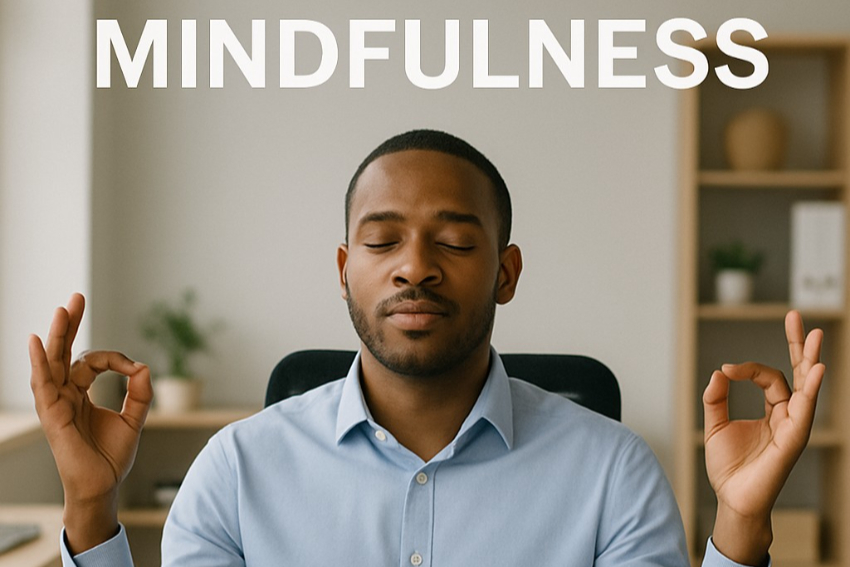The Skills Coach: Micro-mindfulness: Simple daily practices for lawyer well-being
The Skills Coach: Micro-mindfulness: Simple daily practices for lawyer well-being
By Lori Berman (with Nora Zeigenfuse)
I don’t meditate. I’ve tried, and it just doesn’t work for me. But when I manage to quiet my mind’s overdrive mode, I’m sharper, more creative, more patient, and I even sleep better.
So, heading into the holidays and New Year, I turned to my colleague Nora Zeigenfuse, a mindfulness expert and senior manager of professional development operations and CLE at Crowell and Moring, for advice on calming our minds. My only condition: Keep it under five minutes to give mindfulness a fighting chance.
So, take a breath and read on. Warning: Mindfulness has been known to make people more productive.
Mindfulness defined
According to Jon Kabat-Zinn – who brought Mindfulness-Based Stress Reduction (MBSR) programs into mainstream institutions, including over 700 hospitals and medical centers worldwide – mindfulness is:
- Paying attention
- On purpose
- In the present moment
- Non-judgmentally
Think about your current daily routine. Is there a time when you stop and do nothing? No music, no phone, no work – literally nothing except be in the present moment. Research shows that moments like these reduce stress, anxiety, and even chronic pain, while increasing focus, clarity and emotional regulation.
Below are five ways to practice mindfulness in five minutes or less, no meditation required.
1. Mindful self-talk: Replace “I have to” with “I get to”
When something feels overwhelming, try reframing it as a growth opportunity or an experience that you might be grateful for. Maybe due diligence doesn’t seem exciting, but consider thinking, “I get to learn a new skill and contribute to an important client.” Shifting your focus to “I get to” and noticing how it makes you feel is the first step. After that, break the task into doable pieces.
2. Mindful gratitude
Expressing appreciation for others (and yourself!) has measurable benefits: It lowers cortisol levels, strengthens emotional regulation, and boosts resilience. It also builds more positive working relationships. Take a few moments during reoccurring meetings to thank someone for their help or effort. Once you start making gratitude a habit, you’ll find it becomes a natural part of your day.
3. Mindful pauses? The STOP technique
The STOP technique is a quick, intentional pause to help you ground yourself in the present moment and move your thinking from a state of “flight or fight” to operating from a place of reason.
Stop your activity and bring your full awareness to what you’re feeling and experiencing. Ground yourself in this moment of time.
Take a breath. Notice your breath moving through your body.
Observe your thoughts, emotions, and physical sensations.
Proceed to your activity with greater awareness and intention.
So, when you’re at the height of a stressful situation – such as a client emergency or a tight deadline – STOP before you proceed. You may notice the physical sensations in your body, such as tensed shoulders and a racing heartbeat. Using STOP will help you recover faster and stay composed.
4. Mindful eating
We all eat, but how often do we really pay attention to eating? Try bringing full awareness to one meal a week. Put away all devices and lower distractions (candlelight helps) and bring full awareness to the table and your body. Are you hungry? Notice how the food looks, smells, and tastes. Engage all five senses and savor each bit. Pay attention to when you feel full. Are you eating out of hunger or something else? Also notice how different foods make you feel afterward: Energized or sluggish? If you are with other people, talk about what you notice.
5. Mindful walking
It sounds simple, but try going for a mindful walk. Leave your phone, podcast, and music behind so it’s just you, your thoughts, and maybe your dog. As you walk, engage all five senses: Literally stop and smell the roses, feel the breeze or the sun on your face, listen to the sound of your footsteps. Even five minutes can reset your mind and body.
Extra credit. Turn off your smart watch and, if you must carry your phone, silence notifications. Creating these boundaries reduces distractions and helps you stay fully present. For a longer walk, you can always let people know and ask them to call you if it’s an emergency.
Final thoughts
Building a mindfulness practice strengthens your ability to stay present, focused, and calm. Even five minutes a day can make a noticeable difference in work productivity. If you do it consistently, it will become a habit and natural part of your daily routine.
As you head into the holidays try to do it mindfully. And don’t just take it from us. Supreme Court Justice Stephen Breyer once said, “I read once that the practice of law is like attempting to drink water from a fire hose. And if you are under stress, meditation [or mindfulness] – or whatever you choose to call it – helps.”
Five minutes. Endless returns.
(If you’d like to explore meditation, consider joining Mindfulness in Law Society for twice-weekly, virtual, lawyer-run meditations).

Lori Berman, Ph.D. (left), is an organizational psychologist and vice president of learning at Legal Innovators, an end-to-end, talent management solution for law firms and corporate legal departments. Previously, Dr. Berman was director of professional development at Hogan Lovells. She is also co-author of the book, Accelerating Lawyer Success: How to Make Partner, Stay Healthy, and Flourish in a Law Firm. You can reach her at [email protected].
Nora Zeigenfuse is a certified mindfulness facilitator and senior manager of professional development operations and CLE at Crowell and Moring LLP. In her role she designs, implements, and assists in leading professional development initiatives for staff and attorneys, with a focus on providing innovative CLE and training solutions. Reach her at [email protected].
Share this story, choose a platform
Brought to you by BridgeTower Media
Free Weekly Newsletter
Recommended content
The Skills Coach: You advocate – But do you ask?
The Skills Coach: You advocate – But do you ask? By Lori Berman From the outset, lawyers are trained to [...]
Practical lessons on becoming a rainmaker
Rainmaking is a skill that can be learned, practiced, and refined over time. But it requires discipline, intention, and persistence. [...]
The 3 AI models for law firms
The capabilities of AI tools, and their acceptance within the legal industry, have led to these distinct models of usage [...]
PPC (pay-per-click) vs. SEO (search engine optimization)
Both marketing channels play different roles, and come with their own timelines and risks. Read more @ searchenginejournal.com






